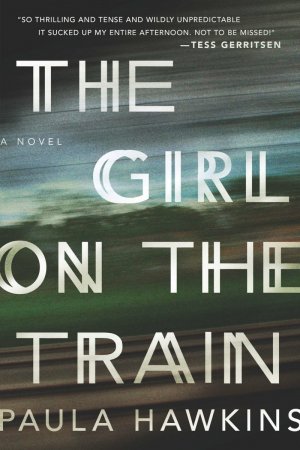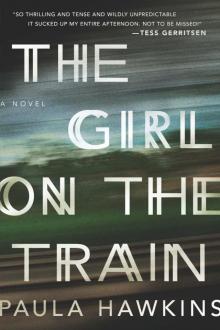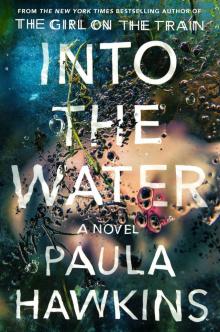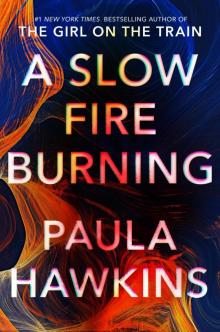- Home
- Paula Hawkins
Into the Water Page 30
Into the Water Read online
Page 30
We sat in my room for a bit. It was kind of awkward because we didn’t know what to say to each other. I asked if she’d had any more news and she sort of looked blank and I said, about Mr. Henderson, and she shook her head. She didn’t seem to want to talk about it. There’s been lots of rumours—people at school are saying that she killed him and pushed him into the sea. I think it’s rubbish, but even if it isn’t, I wouldn’t blame her.
I know it would have made Katie really unhappy for something to happen to Mr. Henderson, but she doesn’t know, does she? There’s no such thing as an afterlife. All that matters are the people who are left, and I think that things have improved. Mum and Dad aren’t happy, but they’re getting better, they’re different than they were. Relieved, maybe? Like they don’t have to wonder anymore about why. They’ve got something they can point to and say, there, that’s why. Something to hold on to, someone said, and I can see that, although for me I don’t think any of it will ever make any sense.
LOUISE
The suitcases were in the car and the boxes were labelled and just before noon they would hand over the keys. Josh and Alec were doing a quick tour of Beckford, saying their goodbyes, but Louise had stayed behind.
Some days were better than others.
Louise had stayed to say goodbye to the house where her daughter had lived, the only home she’d ever known. She had to bid farewell to the height chart in the cupboard under the stairs, to the stone step in the garden where Katie had fallen and cut her knee, where for the first time Louise had had to face that her child wouldn’t be perfect, she would be blemished, scarred. She had to say goodbye to her bedroom, where she and her daughter had sat and chatted while Katie blow-dried her hair and applied her lipstick and said that she was going to Lena’s later and would it be all right if she stayed the night? How many times, she wondered, had that been a lie?
(The thing that kept her awake at night—one of the things—was that day by the river when she’d been so touched, so moved, to see tears in Mark Henderson’s eyes when he offered his condolences.)
Lena had come to say goodbye and had brought with her Nel’s manuscript, the pictures, the notes, a USB with all the computer files. “Do what you want with it,” she said. “Burn it if you like. I don’t want to look at any of it again.” Louise was glad that Lena had come, and gladder still that she would never have to see her again. “Can you forgive me, do you think?” Lena asked. “Will you ever?” And Louise said that she already had, which was a lie, spoken out of kindness.
Kindness was her new project. She hoped it might be gentler on the soul than anger. And in any case, while she knew that she could never forgive Lena—for her dissembling, for her secret-keeping, for simply existing where her own daughter did not—she couldn’t hate her either. Because if anything was clear, anything at all, if anything in this horror was without doubt, it was Lena’s love for Katie.
December
NICKIE
Nickie’s bags were packed.
Things were quieter in the town. It was always like that with winter coming, but lots of people had moved on, too. Patrick Townsend was rotting in his cell (ha!) and his son had run away to find some peace. Good luck to him with that. The Mill House was empty, Lena Abbott and her aunt off to London. The Whittakers had left, too—the house was on the market for less than a week, it seemed, before some people with a Range Rover and three children and a dog turned up.
Things were quieter in her head, too. Jeannie wasn’t talking as loudly as she used to, and when she did, it was more of a chat, less of a tirade. These days, Nickie found she spent less time sitting at the window looking out and more time in bed. She felt very tired and her legs ached more than ever.
In the morning, she was going to Spain, for two weeks in the sunshine. Rest and recreation, that was what she needed. The money came as a surprise: ten thousand pounds from Nel Abbott’s estate, left to one Nicola Sage of Marsh Street, Beckford. Whoever would have thought it? But then perhaps Nickie shouldn’t have been surprised, because Nel was really the only one who’d ever listened. Pour soul! Much good it did her.
ERIN
I went back just before Christmas. I can’t really say why, except that I’d dreamed about the river almost every night, and I thought a trip to Beckford might exorcize the demon.
I left the car by the church and walked north from the pool, up the cliff, past a few bunches of flowers dying in cellophane. I walked all the way to the cottage. It was hunched and miserable, with its curtains drawn and red paint splashed on the door. I tried the handle, but it was locked, so I turned and crunched down over the frosted grass to the river, which was pale blue and silent, mist rising off it like a ghost. My breath hung white in the air in front of me, my ears ached with the cold. Should have worn a hat.
I came to the river because there was nowhere else to go, and no one to talk to. The person I really wanted to speak to was Sean, but I couldn’t find him. I was told he’d moved to a place called Pity Me in County Durham—it sounds made up, but it isn’t. The town is there, but he wasn’t. The address I was given turned out to be an empty house with a TO LET sign outside. I even contacted HM Prison Frankland, which is where Patrick will see out the rest of his days, but they said the old man hadn’t had a single visitor since his arrival.
I wanted to ask Sean for the truth. I thought he might tell me, now he’s no longer with the police. I thought he might be able to explain how he’d lived the life he did and whether, when he was supposedly investigating Nel’s death, he’d known about his father all along. It wouldn’t be such a stretch. He’d been protecting his father all his life, after all.
The river itself offered no answers. When, a month back, a fisherman dug a mobile phone out of the mud in which his Wellington boots were planted, I had hope. But Nel Abbott’s phone told us nothing we hadn’t already gleaned from her phone records. If there were damning photographs, images that would explain all that was left unexplained, we had no way of accessing them—the phone wouldn’t even turn on, it was dead, its insides clogged and corroded by silt and water.
After Sean left, there was a mountain of paperwork to get through, an inquiry, questions asked and left unanswered over what Sean knew and when, and why the fuck the whole thing had been handled as badly as it had. And not just Nel’s case, but Henderson’s, too: how was it that he was able to disappear without trace from under our noses?
As for me, I just went over and over that last interview with Patrick, the story he told. Nel’s bracelet torn from her wrist, Patrick grabbing her arm. The struggle they’d had up there on the cliff before he pushed her. But there had been no bruises in the places where he said he had grabbed her, no marks on her wrist where he’d torn off that bracelet, no signs of any struggle whatsoever. And the clasp on the bracelet was unbroken.
I did point all of this out at the time, but after everything that had happened, after Patrick’s confession and Sean’s resignation and all the general arse-covering and buck-passing, no one was really in the mood to listen.
I sat by the river and I felt as I’d been feeling for a while: that all this, Nel’s story and Lauren’s and Katie’s, too, it was all incomplete, unfinished. I never really saw all there was to see.
HELEN
Helen had an aunt who lived outside Pity Me, just north of Durham. She had a farm, and Helen could remember visiting one summer, feeding donkeys with bits of carrot and picking blackberries in the hedgerows. The aunt was no longer there; Helen wasn’t sure about the farm. The town was shabbier and poorer than she’d remembered and there were no donkeys to be seen, but it was small and anonymous and no one paid her any mind.
She’d found herself a job for which she was overqualified, and a small ground-floor flat with a patio at the back. It got the sun in the afternoon. When they first got to the town, they rented a house, but that only lasted a matter of weeks and then she woke up one morning and Sean was gone, so she gave the keys bac
k to the landlord and started looking again.
She hadn’t tried to call him. She knew he wasn’t coming back. Their family was broken, it was always going to break without Patrick, he was the glue that held them together.
Her heart, too, was shattered in ways she didn’t like to think about. She hadn’t been to visit Patrick. She knew she shouldn’t even feel sorry for him—he had admitted killing his wife, murdering Nel Abbott in cold blood.
Not cold blood, no. That’s not right. Helen understood that Patrick saw things in very black-and-white terms, and that he believed, genuinely believed, that Nel Abbott was a threat to their family, to their togetherness. She was. And so he acted. He did it for Sean, and he did it for her. That’s not so cold-blooded, is it?
But every night she had the same nightmare: Patrick holding her tabby under the water. In the dream, his eyes were sealed shut but the cat’s were open, and when the struggling animal twisted its head around towards her, she saw that its eyes were bright green, just like Nel Abbott’s.
She slept badly, and she was lonely. A few days previously she had driven twenty miles to the nearest garden centre to purchase a rosemary bush. And later that day she was driving to the animal-rescue centre over in Chester-le-Street, to select a suitable cat.
January
JULES
It’s an odd thing, to sit across the breakfast table every morning from fifteen-year-old you. She has your same bad table manners, and rolls her eyes as hard as you did when this is pointed out. She sits at the table with her feet tucked up underneath her on the chair, bony knees sticking out to either side, exactly the way that you used to do. She adopts the same dreamlike expression when she is lost in music, or thought. She doesn’t listen. She is wilful and annoying. She sings, constantly and tunelessly, just like Mum did. She has our father’s laugh. She kisses me on the cheek every morning before she goes to school.
I cannot make up to you the things I did wrong—my refusal to listen to you, my eagerness to think the worst of you, my failure to help you when you were desperate, my failure to even try to love you. Because there is nothing I can do for you, my atonement will have to be an act of motherhood. Many acts of motherhood. I could not be a sister to you, but I will try to be a mother to your child.
In my tiny, ordered Stoke Newington flat, she wreaks havoc on a daily basis. It takes an enormous effort of will not to become anxious and panicked by the chaos. But I’m trying. I remember the fearless version of myself who surfaced the day I confronted Lena’s father; I would like that woman to return. I would like to have more of that woman in me, more of you in me, more of Lena. (When Sean Townsend dropped me home on the day of your funeral, he told me I was like you, and I denied it, I said I was the anti-Nel. I used to be proud of that. Not anymore.)
I try to take pleasure in the life I have with your daughter, since she’s the only family I have, or will ever have now. I take pleasure in her, and comfort in this: the man who killed you will die in jail, not too long from now. He is paying for what he did to his wife, and to his son, and to you.
PATRICK
Patrick no longer dreamed of his wife. Nowadays he had a different dream, in which that day at the house played out differently. Instead of confessing to the detective, he took the paring knife from the table and put it into her heart, and when he was done with her, he started on Nel Abbott’s sister. The excitement of it built and built until, finally sated, he pulled the knife from the sister’s chest and looked up, and there was Helen, watching, tears coursing down her cheeks and blood dripping from her hands.
“Dad, don’t,” she said. “You’re scaring her.”
When he woke, it was always Helen’s face he thought of, her stricken expression when he told them what he’d done. He was grateful that he did not have to witness Sean’s reaction. By the time his son returned to Beckford that evening, Patrick’s confession had been made in full. Sean came to visit him once, on remand. Patrick doubted he would come again, which broke his heart, because everything he had done, the stories he had told and the life he had constructed, it had all been for Sean.
SEAN
I am not what I think I am.
I was not who I thought I was.
When things started to fracture, when I started to fracture, with Nel saying things she shouldn’t have said, I held the world together by repeating: Things are the way they are, the way they’ve always been. They cannot be different.
I was the child of a suicided mother and a good man. When I was the child of a suicided mother and a good man, I became a police officer; I married a decent and responsible woman and lived a decent and responsible life. It was simple, and it was clear.
There were doubts, of course. My father told me that after my mother died, I didn’t speak for three days. But I had a memory—what I thought was a memory—of speaking to kind, sweet Jeannie Sage. She drove me back to her house that night, didn’t she? Didn’t we sit, eating cheese on toast? Didn’t I tell her how we’d gone to the river in the car together. Together? she asked me. All three of you? I thought it best not to speak at all then, because I didn’t want to get things wrong.
I thought I remembered all three of us being in the car, but my father told me that was a nightmare.
In the nightmare, it wasn’t the storm that woke me, it was my father shouting. My mother, too, they were saying ugly things to each other. Her: failure, brute; him: slut, whore, not fit to be a mother. I heard a sharp sound, a slap. And then some other noises. And then no noise at all.
Just the rain, the storm.
Then a chair scraping across the floor, the back door opening. In the nightmare, I crept down the stairs and stood outside the kitchen, holding my breath. I heard my father’s voice again, lower, muttering. Something else: a dog, whimpering. But we didn’t have a dog. (In the nightmare, I wondered if my parents were arguing because my mother had brought a stray dog home. It was the sort of thing she’d do.)
In the nightmare, when I realized I was alone in the house, I ran outside, and both my parents were there, they were getting into the car. They were leaving me, abandoning me. I panicked, I ran screaming to the car and clambered into the backseat. My father dragged me out, yelling and cursing. I clung to the door handle, I kicked and spat and bit my father’s hand.
In the nightmare, there were three of us in the car: my father driving, me in the back, and my mother in the passenger seat, not sitting up properly but slumped against the door. When we rounded a sharp bend, she moved, her head lolling over to the right so that I could see her, I could see the blood on her head and on the side of her face. I could see that she was trying to speak, but I couldn’t understand what she was saying, her words sounded strange, as though she were talking in a language I didn’t understand. Her face looked strange, too, lopsided, her mouth twisted, her eyes were white as they rolled back into her head. Her tongue lolled from her mouth like a dog’s; pink, frothy saliva oozed from the side of her mouth. In the nightmare, she reached for me and touched my hand and I was terrified, I cowered back in my seat and clung to the door, trying to get as far away from her as I could.
My father said, Your mother reaching for you, that was a nightmare, Sean. That wasn’t real. It’s like that time you said you could remember having kippers at Craster with your mum and me, but you were only three months old then. You said you remembered the smokehouse, but it was only because you’d seen a picture. It was like that.
That made sense. It didn’t feel right, but at least it made sense.
When I was twelve, I remembered something else: I remembered the storm, running out into the rain, but this time, my father wasn’t getting into the car, he was putting my mother into it. Helping her into the passenger seat. That came to me very clearly, it didn’t seem to be part of the nightmare, the quality of the memory seemed different. In it, I was afraid, but it was a different sort of terror, less visceral than the one I felt when my mothe
r reached for me. It troubled me, that memory, so I asked Dad about it.
He dislocated my shoulder knocking me against the wall, but it was what happened afterwards that stuck. He said he needed to teach me a lesson, so he took a filleting knife and cut cleanly across my wrist. It was a warning. “This is so you remember,” he said. “So you never forget. If you do, it’ll be different next time. I’ll cut the other way.” He placed the tip of the blade on my right wrist, at the base of my palm, and dragged its point slowly towards my elbow. “Like that. I don’t want to discuss this again, Sean. You know that. We’ve talked about it quite enough. We don’t mention your mother. What she did was shameful.”
He told me about the seventh circle of hell, where suicides are turned to thorny bushes and fed upon by Harpies. I asked him what a Harpy was and he said, your mother was one. It was confusing: was she the thorny bush, or was she the Harpy? I thought of the nightmare, of her in the car, reaching out to me, her mouth open and bloody drool dripping from her lips. I didn’t want her to feed upon me.
When my wrist healed, I found the scar very sensitive and quite useful. Whenever I found myself drifting, I would touch it, and most times, it brought me back to myself.
There was always a fault line there, in me, between my understanding of what I knew had happened, what I knew myself to be and my father to be, and the strange, slippery sense of wrongness. Like dinosaurs not being in the Bible, it was something that made no sense and yet I knew it had to be. It had to be, because I had been told these things were true, both Adam and Eve and brontosaurus. Over the years there were occasional shifts, and I felt the tremor of earth above the fault line, but the quake didn’t come until I met Nel.

 Girl on the Train
Girl on the Train The Girl on the Train
The Girl on the Train Into the Water
Into the Water A Slow Fire Burning
A Slow Fire Burning